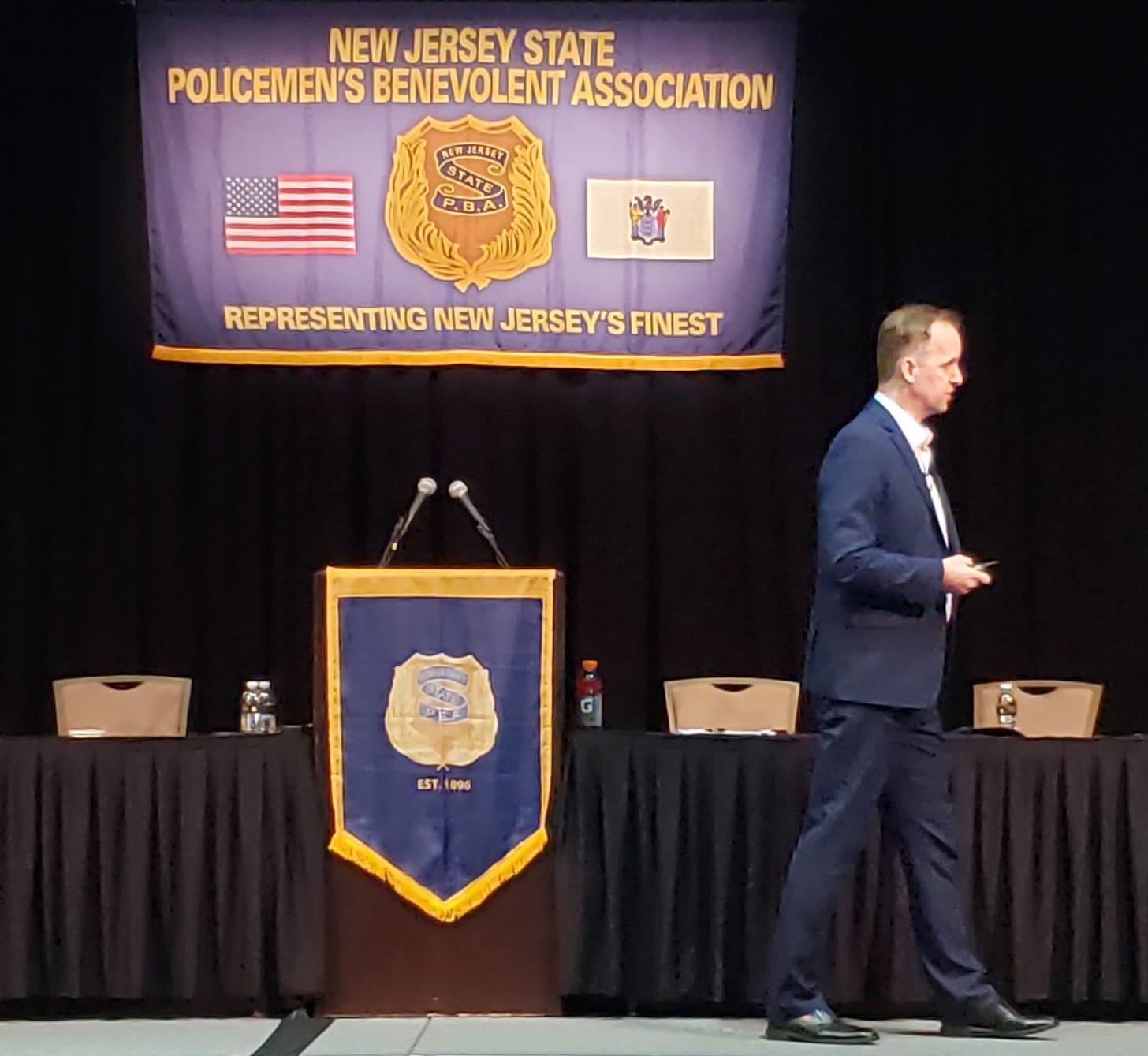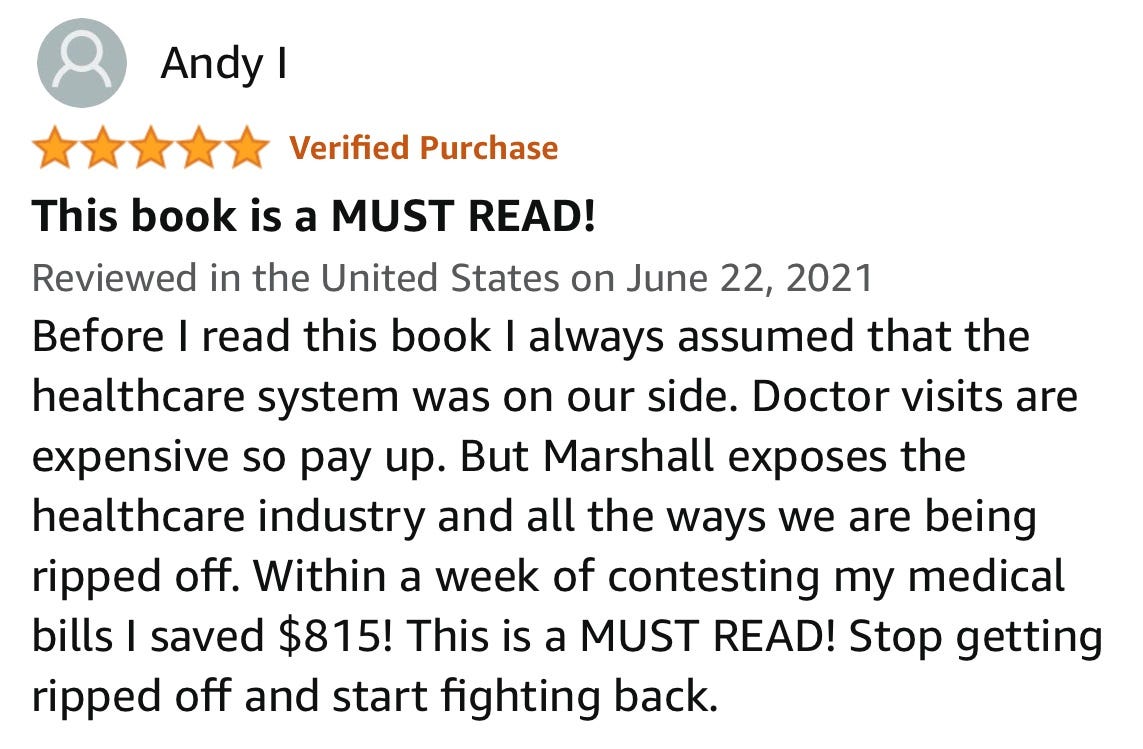Calling the Cops On American Health Care
We can empower working Americans by showing them how they're getting swindled - and how they can take action to protect their pocketbooks.
I recently had the honor of speaking to about 1,000 New Jersey cops about the high cost of health care.
On my way to breakfast the morning of my speech I struck up a conversation with one of the younger attendees. He joked that he could only think of one solution to his out-of-control health care costs: “Marry someone with better benefits.”
Gallows humor is all many working Americans can muster when it comes to the problem of high health care costs. Year after year, Americans call the cost of health care their number one financial concern. And the problem keeps getting worse.
It was a treat to speak about the problem to the New Jersey State Policemen’s Benevolent Association at their recent conference. But it was also a big test. I wrote “Never Pay the First Bill: And Other Ways to Fight the Health Care System and Win,” to boost the health literacy of working Americans. That includes the cops that filled this ballroom at the Hard Rock Hotel and Casino in Atlantic City. But anyone who has been to a health benefits enrollment meeting can tell you that it’s hard to get employees to pay attention. Working Americans have been conditioned to be passive and apathetic about their health benefits. They don’t realize they are paying thousands of dollars a year more than they should, and assume it’s too complicated to understand. Talking to a bunch of cops about health benefits could be a tough sell.
Layer onto that the fact that my topic didn’t sound sexy compared to the other speakers on the agenda. The day before I spoke the cops heard from a guy who had infiltrated Al-Qaeda to fight terrorism. Wow. The guy following me had gone undercover to take down violent motorcycle gangs. I had to bring my A-game to engage this group. Here’s how I did it.
Police officers are usually protecting victims, but in this case, I told them, they are the victims. That got their attention. Working Americans are being swindled by the health care system. I use that word carefully. The definition of swindle is to “use deception to deprive (someone) of money or possessions.” Deception is one of the key ways the health care system takes more of our money than it should.
Let’s consider a few common forms of deception that have become accepted in health care:
We don’t see the prices. It’s standard to receive health care services without knowing how much they will cost. That’s crazy. The Hospital Price Transparency Rule requires hospitals to post their cash prices and all their discounted prices with Medicare and commercial insurance companies. But it appears that most hospitals are not complying. Only 10 of the 46 hospitals in the Northern New Jersey-NY area were fully complying with the rule, based on the data from HealthCostLabs.com. We wouldn’t accept hiding prices in any other industry, and we shouldn’t accept it in health care.
The prices are not based on the actual cost of goods. The price working Americans pay for health care is generally not based on the actual cost. It’s based on whatever hospitals or other medical institutions think they can get. I love this video by Dr. Eric Bricker, where he explains that most hospitals do not even know how much it costs them to provide various services. So how are the prices set? Through secret negotiations that are based on market share and marquee brand names. Those negotiations are designed to maximize the prices – whether or not it’s fair to patients.
Patients are tricked into paying more than they should. It makes no sense for one patient to pay more than another for medical treatment, merely because of their insurance coverage. But that happens every day in hospitals nationwide. To illustrate the point for the New Jersey cops, I looked up the prices listed on the website of Bayonne Medical Center. For a Level 3 Emergency Room visit, Medicare’s price is listed at $223, Cigna’s is $781, Horizon (BCBS) pays $818 and UnitedHealthcare pays a whopping $1,718. Meanwhile, the cash price was $256. This makes no sense, and it’s penalizing patients and employers based on their insurance coverage. It’s only possible because of the deception that’s built into health care pricing.
We have to fight these deceptive practices and demand a fair deal, I told the cops. This led to my second point: When we fight back, we can win. That’s what my book is all about. I showed the cops how a young woman in New Jersey saved thousands by pushing back after she got overcharged for a simple visit to the emergency room. I showed how a mom in Texas contested an upcoded ER bill and saved almost $500. I showed how my friend Jeff avoided an unnecessary back surgery. And I showed how a couple in North Carolina got a refund by using a sample letter in my book to warn a hospital that it risked getting sued in small claims court.
The point is this: Patients can win when they push back against these deceptive practices. When they do, they can save hundreds or thousands of dollars per health care interaction. And when the patients save, the health plan saves, too. We can lower the cost of health care by equipping and empowering working Americans. My book shows how it’s done, and I’m helping patients apply the principles and tactics every day. If you’d like my help, you can contact me through my website, marshallallen.com, and I’ll walk you through it.
It felt great to win over the crowd that morning in Atlantic City. The cops are eager to take on the challenge and just need to be equipped. The same is true for other working Americans. Employees want to know what they can do about the ridiculous health care costs they and their employers are paying. We just need to educate them.
I’m grateful for you: I’ve been overwhelmed by the response to my tribute to my dad, who died last week. Thank you! It was an honor for me to give him a shout out and share how he modeled integrity to me. It’s a huge encouragement to have you all share it and respond with such heartfelt love for me and my family.
“Never Pay the First Bill” is saving people money: Reviews like this one make my day.
“The Never Pay Pathway” video curriculum update: I am pumped about my health literacy videos that are based on my book. The curriculum will include 16 short videos, 3-5 minutes each, that will clearly communicate the principles and tactics in my book. The animated illustrations and graphics are stylish and cheeky and communicate in a way that’s engaging and fun. Many of you donated to my crowdfunding campaign to make these videos a reality, so I know you are eager to see them, too. It will be so fun to release them because it will help bring more of this knowledge to scale, so more working Americans can be empowered.
Subscriber update: This newsletter is free, but I encourage you to become a paid subscriber. I’m donating 100% of the proceeds from paid subscriptions to patients who need help. I’m up to 69 paid subscribers - which is awesome! The number of free subscriptions is also on the rise. Please share this newsletter and encourage others to subscribe. Let’s work together to take educating and empowering patients mainstream.
As always, reach out to me if you have any questions about what I’m doing, or ideas for me.






